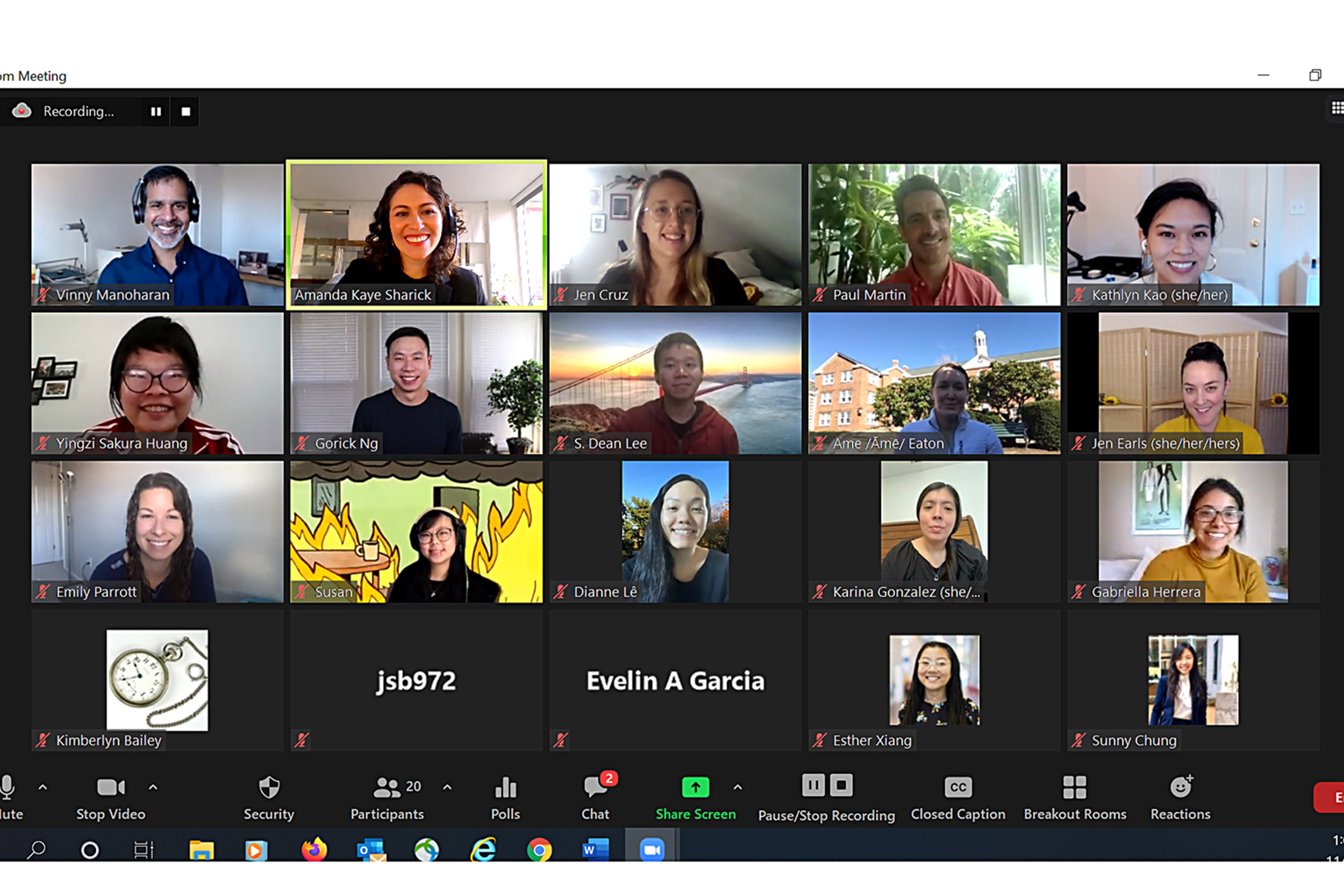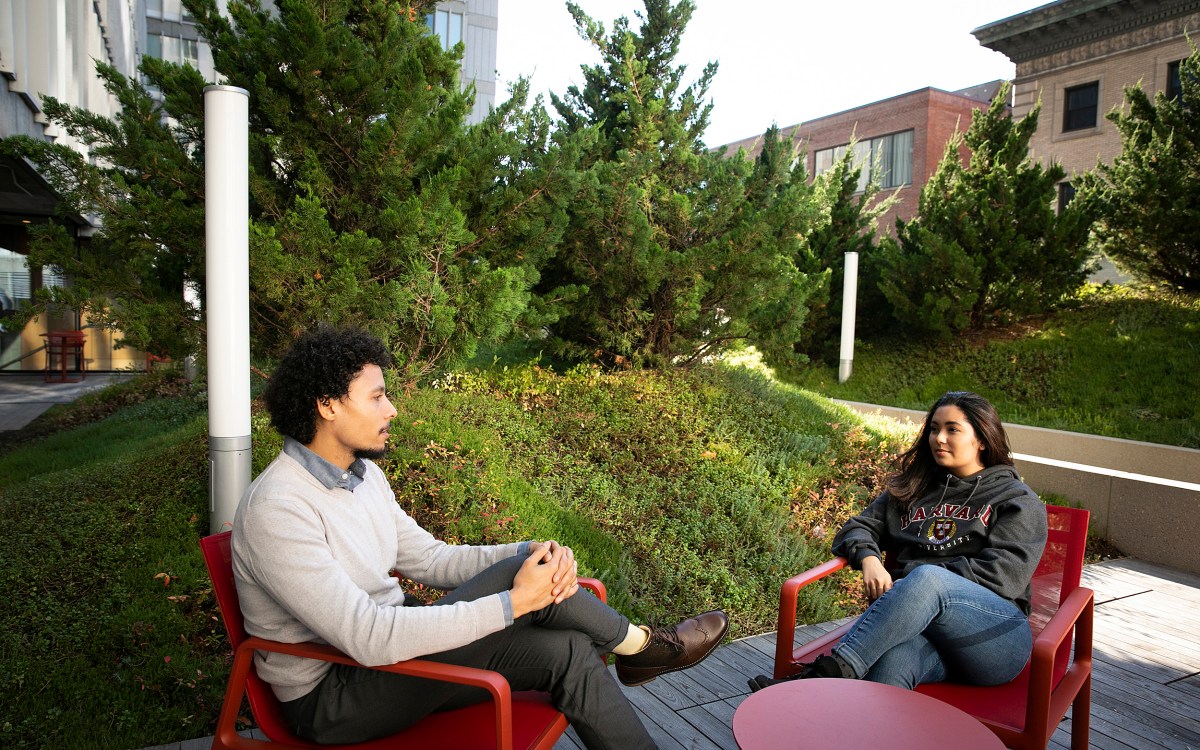
More than 50 attendees took part in the Second Annual First Generation Student Celebration Day on Nov. 8, a Harvard-wide virtual event to honor the contributions of the first and next-generation community of students, staff, faculty, and alumni.
Amanda Sharick/Harvard University
Harvard comes together to support next-gen students
New initiative taps Schools, programs, and services to help students surmount obstacles
Working hard to achieve success is not uncommon for Harvard students. But for first-generation, lower-income (FGLI) undergraduate and graduate students, institutional challenges come with a different set of obstacles.
“Research shows that most first-generation, lower-income students possess the internal resources they need to support their success but often lack the organizational and navigational knowledge and faculty engagement to construct experiences of thriving on campus,” said Shandra Jones, a first-generation Ph.D. candidate concentrating in human development, learning, and teaching at the Harvard Graduate School of Education (HGSE) and the Graduate School of Arts and Sciences (GSAS).
More than 15 percent of Harvard College students are first in their families to pursue a college degree. At the 12 graduate and professional Schools, there are a growing number of FGLI students and increasing conversations about how to better support their inclusion and success, especially during a global pandemic. The Harvard University Next Gen Initiative, part of the Culture Lab Innovation Fund, is committed to helping all Harvard undergrads and grad students who are FGLI, international, undocumented, DACAmented, or from mixed-status households.
The term “next-gen” encompasses a range of underrepresented students and signals their leadership potential. The initiative addresses shared challenges, and helps all next-gen College and graduate students succeed.
But the task is not easy, said Amanda K. Sharick, who leads the next-gen project and is the senior program manager for Harvard’s Graduate Commons Program. As a Mexican American and the first in her family to earn any advanced degree, Sharick knows how important it was to have a clear pathway toward her degrees. The core challenge, she said, is identifying available and sustainable resources, and finding a way to ensure all first- and next-generation students have access to them.

Participants at the Second Annual First Generation Student Celebration Day online, submitted affirmation cards to recognize and acknowledge the strengths and values of the next-gen community.
Amanda Sharick/Harvard University
“The Next Gen Initiative is intentional about aligning and enhancing Harvard’s existing institutional supports to increase awareness, access, and effectiveness to support the talents and contributions of these students,” she said. “They belong here and we are better because of them. They are the next generation to lead.”
On National First Generation College Student Celebration Day, Nov. 8, Sharick hosted the Second Annual First-Generation Student Celebration Day, a Harvard-wide virtual event to honor the contributions of first- and next-generation students, staff, faculty, and alumni. Co-sponsored by the Harvard Foundation, Harvard First Generation Alumni, Harvard Primus, the Immigration Initiative, and the Graduate Commons Program, the event kicked off a month of next-gen virtual programming on skill-building, career development, and mindfulness, as well as a “Know Your Strengths” workshop for first-generation immigrant students.
November also marked the 55th anniversary of the Higher Education Act signed by President Lyndon B. Johnson, which stated, “The path of knowledge is open to all who have the determination to follow it.”
For FGLI alumnus Gorick Ng ’14, M.B.A. ’18, “The word ‘first-gen’ to me is more than just an identity, more than just a community, it’s a superpower. It’s the superpower of hard work, of persistence, of tenacity.”
Ng emphasized the importance of connecting with others to avoid becoming overwhelmed and confused because of “not understanding the rules of the game.”
“You might not know how to approach something, but someone does. Find them, learn from them, do it early, do it often.”
Gorick Ng ’14, M.B.A. ’18
“While we are waiting patiently for one door to open for us, there may be plenty of other people who know how to take a side door,” Ng said. “You might not know how to approach something, but someone does. Find them, learn from them, do it early, do it often.”
Sharick also shared some of the difficulties that first- and next-generation students face, including racial injustice, financial challenges, culture shock, imposter syndrome, and limited family support.
“First-generation students learn a lot by observing and assimilating information from their surroundings, but it is much more difficult now due to remote learning,” Sharick said. “The Zoom classroom has taken away a critical component of information. The observational data they are presented with by their peers, and the clear expectations of what is supposed to be happening, is missing.”
Sharick said there is no baseline for self-regulation or comparison, and no one provides explicit feedback or validates how FGLI students fit in, leaving them to wonder, “Am I doing it right?”
An immigrant and former first-generation student herself, Martiza Hernandez, dean of enrollment services at HGSE and a Next Gen Initiative project adviser, said she understands the importance of growing a program for first- and next-generation students, something she didn’t have in college.
“It was a lot of trial and error and reaching out to people who could guide me in this journey, and learning to understand the resources and supports that are there,” she said. “Especially now that we are remote, we need community more than ever. Remember we aren’t alone, and that we’re still here.”

In 2019, first-generation students gathered for a reception following Morning Prayers at the Memorial Church.
File photo by Jeffrey Blackwell/Harvard University
According to the national Center for First-Gen Success, 33 percent of students are the first members of their families to attend college, and 27 percent complete a bachelor’s degree in four years. But the path for graduate students is less explicit, Sharick said. Success centers around creating a centralized, clear trajectory across disciplines and departments, aligning a degree track with meaningful work, and supporting mental health wellness.
“The top asks from graduate students are about career development opportunities, financial resources, and mental health, which is critical going forward,” she said. “The stress caused by these challenges is tremendous. Success all comes down to well-being.”
In collaboration with the University’s Counseling and Mental Health Services, the Next Gen Initiative offered a four-week virtual series this October, “Living with C.O.U.R.A.G.E.,” which taught students how to lean on their values. In November, the Next Gen Initiative partnered with career service offices across FAS, HGSE, Harvard Business School, and Harvard Kennedy School to create offerings relevant to the next-gen student experience. In January, the initiative will work with the Harvard University Employees Credit Union on a program to help advance financial knowledge for first- and next-generation students.
This past spring, Paul Martin ’94, president of First Generation Harvard Alumni, led fundraising efforts in spring for the Opportunity Fund that raised approximately $90,000, covering 180 individual grants to help students meet the financial gaps created by COVID-19. The group was founded in 2014 to create a networking space for first-generation alumni, and includes a mentorship program for first-years to help them learn about available resources and how to advocate for themselves.
More like this
“We are a bridge as they transition from college into the next stage of greatness,” he said.
At the Celebration Day event, Vinothan Manoharan, Wagner Family Professor of Chemical Engineering and professor of physics and faculty adviser for the Next Gen Initiative, said this is a good time for first-generation students to reflect on “how they got here” and “where they are now,” how those have changed, and celebrate their own personal journey.
“The pandemic made it impossible for most students to come to Harvard, to campus, but we are all still here,” he said. “Classrooms may be empty, but the learning is still happening and that goes to show that a University is not just a collection of buildings and facilities, it’s really, at the essence, its people. That’s never been more clear than now.”





